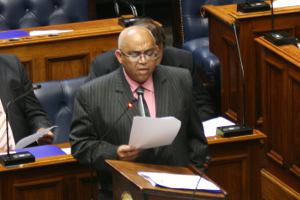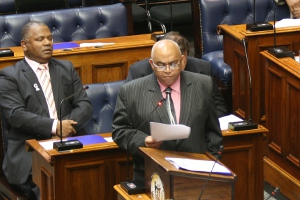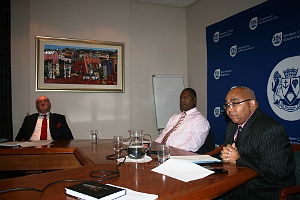
Speeches
Department of Social Development Budget Speech 2012
Honourable Speaker,
Premier, Cabinet Colleagues and Members of this House,
Leaders in Local Government,
Community and religious leaders,
Representatives from our service delivery partners and other NGOs,
Colleagues and friends,
Citizens of the Western Cape,
1. Introduction
Speaker, the Social Development Budget is tabled against the background of significant shifts in the policy and legislative environment governing my department's mandate.
Firstly, the Provincial Cabinet, as executing authority for this province, has approved Provincial Strategic Objective 8, which aims to promote social inclusion and reduce poverty in the Western Cape. My department has been identified as the lead department for implementing key priorities under PSO 8, namely:
- Early childhood development for linguistic, cognitive and personal development of young children.
- The reduction of drug- and alcohol-related harms.
- Youth and family development.
- Support for vulnerable groups.
The Provincial Department of Social Development is also required to play a supportive role in the implementation of food security and after-school programmes under PSO8.
In addition to our provincial strategic shifts, our department has to meet new statutory requirements for service delivery under the recently introduced Children's Act, Child Justice Act and the Older Persons Act.
As such, we have realigned our targets and budgets to deliver on these priorities with quality services that:
- Are properly targeted.
- That rely on evidence-based best practices.
- That are cost effective.
Our approach is reflected in key shifts in this budget. Primarily, we have shifted funds away from unnecessary goods and services, advertising, catering, salaries and travel and subsistence. We have shifted these additional funds to make them available to our best performing NGO partners that provide services aligned to our PSO8 priorities and legislative mandates.
2. The Budget
Allow me now, to give you a short overview of my department's budget for the 2012/2013 financial year, with a focus on the most significant funding allocations.
The department's total budget allocation for 2012/2013 amounts to R1.4 billion, an increase of just over R100 million from the previous financial year.
Programme Two: Social Welfare Services by far takes the lion's share of the budget. It has also received the biggest proportional increase in the budget, reflecting our shift away from unnecessary internal departmental costs in favour of service delivery to our citizens. Indeed, in the past three years, this administration has increased its allocation to welfare services from 70% of the total Social Development budget in 2009 to nearly 84% for 2012/2013 (which is also up from 81% in the 2011/2012 budget).
In terms of alignment with PSO8, the following sub-programmes in welfare services have been prioritised in this budget.
Firstly, substance abuse, prevention and rehabilitation sees an increase of 14% to R77 million this year, nearly R10 million up from the previous year. This will enable us to provide treatment for over 5 000 individuals in need at facilities across the province. This amount also includes increased provision for public information and early intervention services to help prevent the onset of drug- and alcohol-related harms. In addition, we are increasing our provision for youth treatment and early interventions and for Foetal Alcohol Syndrome prevention programmes, especially in rural areas.
Secondly, our services to vulnerable persons receive significant increases. Programmes for persons with disabilities will be funded to the tune of R70 million, an increase of nearly 50% on the R48 million allocated in the 2011 budget. Care and service to older persons increases to R154 million from R140 million budgeted at the beginning of 2011. You will remember that this programme received R140 million last year, and through savings in our adjustment budget, we were able to channel an additional R12 million to the older persons programme in January 2012. This increased net allocation is carried through into the current financial year. Both of these areas of service are of critical importance for my department. We as government have a responsibility to do for people what they cannot reasonably be expected to do for themselves. Disabled citizens, and frail and impoverished older persons, are often the most vulnerable members of our society through no fault of their own. It is therefore incumbent on us as the Department of Social Development to provide safety nets for these citizens.
For too long have we lived with situations where disabled children are chained and locked up in a shack because their families cannot cope with them or find them to be a source of embarrassment. This phenomenon must stop. People living with disabilities can lead meaningful lives and contribute to civil society.
We currently have 23 service centres across the province for persons with disabilities. This is a relatively new concept, but we are committed to capacitating more organisations to offer this service in their communities.
In the case of older persons, we have been able to establish 225 old age service centres across the province. We shall continue to grow the amount of the service centres so that nobody has to be excluded because of distance. At these service centres, the older persons take part in programmes and activities that promote active ageing and overall well-being. Physical exercise is now part of their routine. We provide the facilities, they attend the programmes, and in this way, we can make their lives better together. They also have access to a basket of social services under one roof - from assistance with pension grant applications to ID document applications, chronic medication and housing issues.
Speaker, the third area of social welfare services that has received extra resources in line with PSO8 is child care and protection services, which includes our ECD programmes. This sub-programme sees an increase of R60 million or nearly 15%, to R406 million this year, from R355 million last year. More than 90 000 children will benefit from this allocation. The increase in funding has also come with a drive to improve the quality of ECD services. You will recall that in mid-2011, then-minister Patricia de Lille embarked on a campaign to get all ECD facilities in the Western Cape registered and compliant with legislation. An amnesty period was offered for all ECDs that were operational before 1 February 2011 to come forward and apply for registration with the department before 31 July 2011. The response was phenomenal. We discovered over 2 000 unregistered facilities, most of which have come forward to apply for registration. It is important to note that the registration process involves both provincial and local government requirements, the latter by far being the most complicated and time consuming. Since starting the registration process of the more than 2 000 facilities who received amnesty, we have also completed 300 new registrations to date.
I have in the interim also signed an MOU with the City of Cape Town, in which we undertook to make every attempt to accommodate the ECDs with as little red tape as possible, while still ensuring that the safety of the children is not compromised. Now, all new ECDs must have completed the registration process before they can open their doors legally.
A further shift under welfare services that should be noted here is the absorption of the HIV/AIDS sub-programme into the care and support services to families sub-programme, which receives a total allocation of R38 million. We made this shift in order to mainstream the projects run under the HIV programme with other chronic illness psychosocial support services.
Speaker, our budget for Programme Three: Development and Research also sees significant shifts to align our funding with strategic priorities under PSO 8.
Most notably, our youth development budget jumps tenfold, from R2.4 million to R24 million. It is no secret that I am passionate and committed to extending as many opportunities as possible to the youth of this province, so that they are able to participate in society and lead meaningful lives.
I firmly believe that young people should go to school, stay in school and grab hold of every opportunity that comes along to pave the way for a better adulthood. I am also acutely aware of the limited opportunities and many, many obstacles that young people face in their daily lives.
I am delighted to report that our combined efforts with the Department of Cultural Affairs and Sport to make the MOD centres more attractive to learners have indeed yielded positive results. The MOD centres, which offer sport, educational and cultural activities after school between 14:00 and 18:00, play a vital role in using an existing establishment to promote social inclusion. I have personally visited several MOD centres at both primary and high schools, and I can honestly say that the meals provided to these learners by the Department of Social Development is a daily highlight to many children. Surely, making a meal available in a controlled environment, where the learners also have a role to play in making the programme work, makes a lot more sense than simply setting up a weekly soup kitchen where nameless and faceless people line up for their hand out, and then go back to where they come from, without the state having made any impact on their lives.
Our efforts don't stop at the MOD centres though. I have recently launched an academy of excellence for young people. The first phase focused on soccer. Raw talent is identified in communities and at the MOD centres. These exceptionally talented learners are then absorbed into the academy of excellence where their unique skills are further developed by excellent coaches. They also benefit from life skills coaching and have to embrace a high level of discipline and respect. They are then exposed to sport opportunities that could potentially see them in a sporting career. We are also well on our way to extending the programme to include hip hop, music and theatre. If we are to develop our young people to their full potential, it is important that we learn to speak their language.
The Chrysalis Academy is another lifeline we offer to young people in their quest to find direction in their lives. This year we aim to put more than 600 young people through this intense three month programme where they not only learn valuable life skills, but also get exposed to vocational training like catering, carpentry, welding and safety and security work. It does not stop there though. At the end of last year we made sure that there was a plan in place for each of the nearly 160 graduates who finished that course. Some went back to school, several were given internships both in my department and at the Chrysalis Academy, but by far the bulk of the graduates went on to enrol for further study at FET colleges. We ensured that every graduate was given a bursary for further study in a direction suited to their aptitude, skills set and passion.
Lastly, my department is also rolling out several youth development weekend and holiday camps for deserving matric students. We have particularly identified poor performing schools and we hope to incentivise academic performance in these schools, with the opportunity for these matriculants to be part of a wonderful experience. At these camps, we offer tailor-made programmes to have lasting impact on the lives of these learners. It's not a free for all. They pay a nominal fee of R50, and this gives them a sense of having earned their place on the camp. They get to voice their reasonable expectations, as they have paid for a service, but also get to understand what a privilege it is and what is expected of them if they want to succeed in life.
The increase in the youth development budget has come with a significant decrease to the budget for the Sustainable Livelihoods programme, which has been reduced from R19 million last year to R4 million. It is vital that you understand the rationale behind this shift. Sustainable Livelihood projects previously duplicated functions of Economic Development and Tourism projects. More importantly, over 90% of the department's previous Sustainable Livelihood projects failed. The expertise to establish and nurture business enterprises does not reside within the Department of Social Development, nor should we expect it to. An executive decision has been taken to have the Department of Economic Development and Tourism take the lead in driving entrepreneurship projects, since this department has officials with the relevant specialised business and economics skills.
Speaker, Programme One: Administration, sees a decrease from the previous financial year's allocation, a trend we started last year when the 2011/2012 Goods and Services budget of R190 million was shaved down to R170 million during our adjustment budget and the savings transferred to welfare services. In keeping with this approach, in the budget we table today a lower amount of R189 million has been allocated.
Compensation of employees sees a slightly over inflation related increase of R478 million from last year's R434 million, making provision for recruiting additional social work and related professionals where we have identified the need for capacity in our local offices. I will, however, not over-inflate this department's staff compliment. We employ people based on the jobs that need to done and I expect everyone to work smartly. Managers have to deploy their human resources efficiently and effectively. So far I am pleased to say that the department has embraced this approach. A total of 89% of our funding to be used for NGO rendered welfare services has already been earmarked for specific projects, ready for the start of the financial year. I would like to congratulate everyone involved in this huge effort, from our local offices through to our programme managers and SMS.
This brings me to another key shift in our focus and approach to NGO funding. I am pleased to say that with our increased allocations to NGOs for welfare and other services, we have also brought increased accountability mechanisms to ensure that the public gets value for money, and that the beneficiaries of our services receive quality services.
As such, we have introduced a funding adjudication panel that evaluates all applications for funding from NGO service providers to evaluate the quality of the services, their compliance to legislative prescripts, and the alignment of their projects to PSO8. We have also included, in the contracts we conclude with our NGO partners, a provision for the Auditor-General to visit the NGOs we fund and scrutinise their financial and non-financial data. We are therefore increasing funding to NGOs, but also increasing accountability.
Conclusion:
We have made generous increases to key programmes in our efforts to improve the lives of the poor and vulnerable in this province. At the same time though, we shall continue to promote and practise austerity measures.
I have cut back significantly on catering, jamborees, mass gatherings, advertising materials and any other spending that I do not consider vital to our core mandate of promoting social inclusion and reducing poverty. Any proposal for an event or campaign needs to convince me of the impact and sustainability it will have in the communities we serve.
Reducing poverty remains a huge challenge, and I am hopeful that the shifts and changes we will implement will result in more people being able to access much needed services.
Before I finally conclude, I wish to thank the Premier for her fierce leadership, guidance and support. To my cabinet colleagues, the ministry staff, my executive team, the officials in my department and our service delivery partners, I look forward to a challenging yet rewarding year with all of you as we put our heads together, roll up our sleeves and make the Western Cape better together.
And lastly, to my wife and son, you make our family better together.
I thank you.




